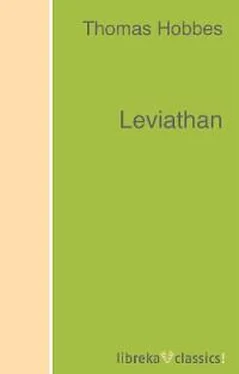Thomas Hobbes - Leviathan
Здесь есть возможность читать онлайн «Thomas Hobbes - Leviathan» — ознакомительный отрывок электронной книги совершенно бесплатно, а после прочтения отрывка купить полную версию. В некоторых случаях можно слушать аудио, скачать через торрент в формате fb2 и присутствует краткое содержание. Жанр: unrecognised, на английском языке. Описание произведения, (предисловие) а так же отзывы посетителей доступны на портале библиотеки ЛибКат.
- Название:Leviathan
- Автор:
- Жанр:
- Год:неизвестен
- ISBN:нет данных
- Рейтинг книги:5 / 5. Голосов: 1
-
Избранное:Добавить в избранное
- Отзывы:
-
Ваша оценка:
- 100
- 1
- 2
- 3
- 4
- 5
Leviathan: краткое содержание, описание и аннотация
Предлагаем к чтению аннотацию, описание, краткое содержание или предисловие (зависит от того, что написал сам автор книги «Leviathan»). Если вы не нашли необходимую информацию о книге — напишите в комментариях, мы постараемся отыскать её.
libreka classics – These are classics of literary history, reissued and made available to a wide audience.
Immerse yourself in well-known and popular titles!
Leviathan — читать онлайн ознакомительный отрывок
Ниже представлен текст книги, разбитый по страницам. Система сохранения места последней прочитанной страницы, позволяет с удобством читать онлайн бесплатно книгу «Leviathan», без необходимости каждый раз заново искать на чём Вы остановились. Поставьте закладку, и сможете в любой момент перейти на страницу, на которой закончили чтение.
Интервал:
Закладка:
Reason Defined
Out of all which we may define, (that is to say determine,) what that is, which is meant by this word Reason, when wee reckon it amongst the Faculties of the mind. For Reason, in this sense, is nothing but Reckoning (that is, Adding and Substracting) of the Consequences of generall names agreed upon, for the Marking and Signifying of our thoughts; I say Marking them, when we reckon by our selves; and Signifying, when we demonstrate, or approve our reckonings to other men.
Right Reason Where
And as in Arithmetique, unpractised men must, and Professors themselves may often erre, and cast up false; so also in any other subject of Reasoning, the ablest, most attentive, and most practised men, may deceive themselves, and inferre false Conclusions; Not but that Reason it selfe is always Right Reason, as well as Arithmetique is a certain and infallible art: But no one mans Reason, nor the Reason of any one number of men, makes the certaintie; no more than an account is therefore well cast up, because a great many men have unanimously approved it. And therfore, as when there is a controversy in an account, the parties must by their own accord, set up for right Reason, the Reason of some Arbitrator, or Judge, to whose sentence they will both stand, or their controversie must either come to blowes, or be undecided, for want of a right Reason constituted by Nature; so is it also in all debates of what kind soever: And when men that think themselves wiser than all others, clamor and demand right Reason for judge; yet seek no more, but that things should be determined, by no other mens reason but their own, it is as intolerable in the society of men, as it is in play after trump is turned, to use for trump on every occasion, that suite whereof they have most in their hand. For they do nothing els, that will have every of their passions, as it comes to bear sway in them, to be taken for right Reason, and that in their own controversies: bewraying their want of right Reason, by the claym they lay to it.
The Use Of Reason
The Use and End of Reason, is not the finding of the summe, and truth of one, or a few consequences, remote from the first definitions, and settled significations of names; but to begin at these; and proceed from one consequence to another. For there can be no certainty of the last Conclusion, without a certainty of all those Affirmations and Negations, on which it was grounded, and inferred. As when a master of a family, in taking an account, casteth up the summs of all the bills of expence, into one sum; and not regarding how each bill is summed up, by those that give them in account; nor what it is he payes for; he advantages himselfe no more, than if he allowed the account in grosse, trusting to every of the accountants skill and honesty; so also in Reasoning of all other things, he that takes up conclusions on the trust of Authors, and doth not fetch them from the first Items in every Reckoning, (which are the significations of names settled by definitions), loses his labour; and does not know any thing; but onely beleeveth.
Of Error And Absurdity
When a man reckons without the use of words, which may be done in particular things, (as when upon the sight of any one thing, wee conjecture what was likely to have preceded, or is likely to follow upon it;) if that which he thought likely to follow, followes not; or that which he thought likely to have preceded it, hath not preceded it, this is called ERROR; to which even the most prudent men are subject. But when we Reason in Words of generall signification, and fall upon a generall inference which is false; though it be commonly called Error, it is indeed an ABSURDITY, or senseless Speech. For Error is but a deception, in presuming that somewhat is past, or to come; of which, though it were not past, or not to come; yet there was no impossibility discoverable. But when we make a generall assertion, unlesse it be a true one, the possibility of it is unconceivable. And words whereby we conceive nothing but the sound, are those we call Absurd, insignificant, and Non-sense. And therefore if a man should talk to me of a Round Quadrangle; or Accidents Of Bread In Cheese; or Immaterial Substances; or of A Free Subject; A Free Will; or any Free, but free from being hindred by opposition, I should not say he were in an Errour; but that his words were without meaning; that is to say, Absurd.
I have said before, (in the second chapter,) that a Man did excell all other Animals in this faculty, that when he conceived any thing whatsoever, he was apt to enquire the consequences of it, and what effects he could do with it. And now I adde this other degree of the same excellence, that he can by words reduce the consequences he findes to generall Rules, called Theoremes, or Aphorismes; that is, he can Reason, or reckon, not onely in number; but in all other things, whereof one may be added unto, or substracted from another.
But this priviledge, is allayed by another; and that is, by the priviledge of Absurdity; to which no living creature is subject, but man onely. And of men, those are of all most subject to it, that professe Philosophy. For it is most true that Cicero sayth of them somewhere; that there can be nothing so absurd, but may be found in the books of Philosophers. And the reason is manifest. For there is not one of them that begins his ratiocination from the Definitions, or Explications of the names they are to use; which is a method that hath been used onely in Geometry; whose Conclusions have thereby been made indisputable.
Causes Of Absurditie
The first cause of Absurd conclusions I ascribe to the want of Method; in that they begin not their Ratiocination from Definitions; that is, from settled significations of their words: as if they could cast account, without knowing the value of the numerall words, One, Two, and Three.
And whereas all bodies enter into account upon divers considerations, (which I have mentioned in the precedent chapter;) these considerations being diversly named, divers absurdities proceed from the confusion, and unfit connexion of their names into assertions. And therefore
The second cause of Absurd assertions, I ascribe to the giving of names of Bodies, to Accidents; or of Accidents, to Bodies; As they do, that say, Faith Is Infused, or Inspired; when nothing can be Powred, or Breathed into any thing, but body; and that, Extension is Body; that Phantasmes are Spirits, &c.
The third I ascribe to the giving of the names of the Accidents of Bodies Without Us, to the Accidents of our Own Bodies; as they do that say, the Colour Is In The Body; The Sound Is In The Ayre, &c.
The fourth, to the giving of the names of Bodies, to Names, or Speeches; as they do that say, that There Be Things Universall; that A Living Creature Is Genus, or A Generall Thing, &c.
The fifth, to the giving of the names of Accidents, to Names and Speeches; as they do that say, The Nature Of A Thing Is In Its Definition; A Mans Command Is His Will; and the like.
The sixth, to the use of Metaphors, Tropes, and other Rhetoricall figures, in stead of words proper. For though it be lawfull to say, (for example) in common speech, The Way Goeth, Or Leadeth Hither, Or Thither, The Proverb Sayes This Or That (whereas wayes cannot go, nor Proverbs speak;) yet in reckoning, and seeking of truth, such speeches are not to be admitted.
The seventh, to names that signifie nothing; but are taken up, and learned by rote from the Schooles, as Hypostatical, Transubstantiate, Consubstantiate, Eternal-now, and the like canting of Schoole-men.
To him that can avoyd these things, it is not easie to fall into any absurdity, unlesse it be by the length of an account; wherein he may perhaps forget what went before. For all men by nature reason alike, and well, when they have good principles. For who is so stupid, as both to mistake in Geometry, and also to persist in it, when another detects his error to him?
Читать дальшеИнтервал:
Закладка:
Похожие книги на «Leviathan»
Представляем Вашему вниманию похожие книги на «Leviathan» списком для выбора. Мы отобрали схожую по названию и смыслу литературу в надежде предоставить читателям больше вариантов отыскать новые, интересные, ещё непрочитанные произведения.
Обсуждение, отзывы о книге «Leviathan» и просто собственные мнения читателей. Оставьте ваши комментарии, напишите, что Вы думаете о произведении, его смысле или главных героях. Укажите что конкретно понравилось, а что нет, и почему Вы так считаете.












